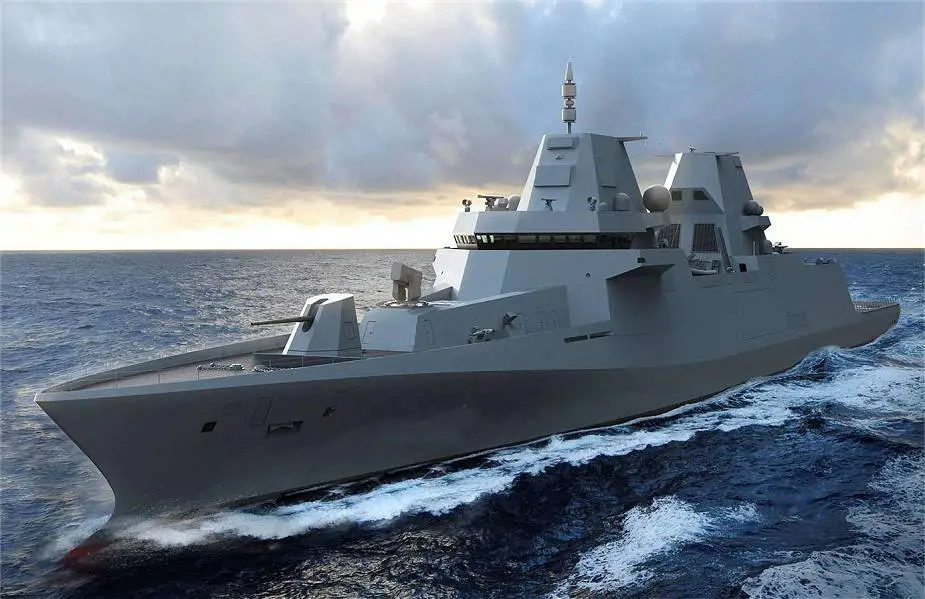Breaking news
DNV wins contract to certificate F126 frigates for Damen.
According to a press release published by Damen on June 23, 2021, the firm and classification society DNV, signed a contract for the comprehensive classification and verification of the new F126 frigates for the German Navy, on June 7th at the DNV Maritime headquarters.
Follow Navy Recognition on Google News at this link
 Artist’s rendering of an MKS 180 (F126) frigate for the German Navy (Picture source: Damen)
Artist’s rendering of an MKS 180 (F126) frigate for the German Navy (Picture source: Damen)
Following the signing of the contract, at its German office, DNV will carry out extensive work and conduct in-depth ship verifications and surveys in Hamburg, Wolgast and Kiel throughout the entire duration of the project.
This will include support in defining the so-called “schedule of performance” certificates and in interpreting the building specifications and documents. DNV will also provide support with regard to the approval of the design and construction of the multi-purpose combat ships throughout the entire construction period.
Damen Naval is building the four frigates (plus a possible two optional extra) together with its partners Blohm+Voss and Thales after the partners were selected as successful bidders in 2020 as the result of a European invitation to tender spanning several years. The first ship is expected to be delivered to the German Navy in Hamburg in 2028. All building work will be carried out in Germany; in Hamburg, Kiel and Wolgast.
DNV boasts a long history and extensive experience in the verification and certification of German naval vessels. Over the last 20 years, for example, DNV has provided support in the plan approval of designs, inspection and survey of newbuilding, and the verification and certification of many German combat units (frigates, corvettes, support ships and submarines). In addition, DNV has provided technical assurance, through classification services for newbuildings, surveys during drydocking periods, and inspections during sea trials, to the non-military crewed vessels of the Bundeswehr since the1970s.
The Netherlands also relies on DNV’s know-how and expertise. For example, four Holland-class offshore patrol vessels and, the largest vessel in the Netherlands Navy, the Joint Support Ship HNLMS Karel Doorman used by both the Royal Netherlands and German navies, were built in accordance with DNV rules and certified by DNV in accordance with the Naval Ship Code. The same will apply to the Combat Support Ship Den Helder, which Damen is currently building.
DNV has also been selected as the classification society for the conceptual design phase recently launched at Damen Naval for four ASW frigates for the Royal Netherlands and Belgian navies. The Military Seaworthiness Authority of the Royal Netherlands Armed Forces strives to ensure that all vessels are verified and examined in accordance with the Naval Ship Code or the Naval Submarine Code by appointing classification societies such as DNV. The involvement of DNV in the certification and classification of naval vessels of both nations underlines the longstanding and extensive German-Dutch cooperation in this field in an exemplary fashion.
MKS 180 (Mehrzweckkampfschiff 180) is the working title for a planned frigate class intended to replace the Brandenburg-class frigates for the German Navy. The ships are to be the largest surface warships to join the Navy since World War II. The first ship is planned to be commissioned in 2028.
The class is to enter service as the Frigate Type 126 or F126, continuing German Navy nomenclature.
The MKS 180 frigate will have a length of 155 meters with a displacement of up to 9,000 tons. With a standard crew of 110 sailors and up to 70 additional crew members, it will be the largest combat ship in service with the German Navy.
The MKS 180 frigate will be armed with medium and short air defense missile systems, long-range anti-ship missiles. It will have a 127 mm main gun able to fire extended-range ammunition as well as automatic cannons and machine gun for its self-protection.


























